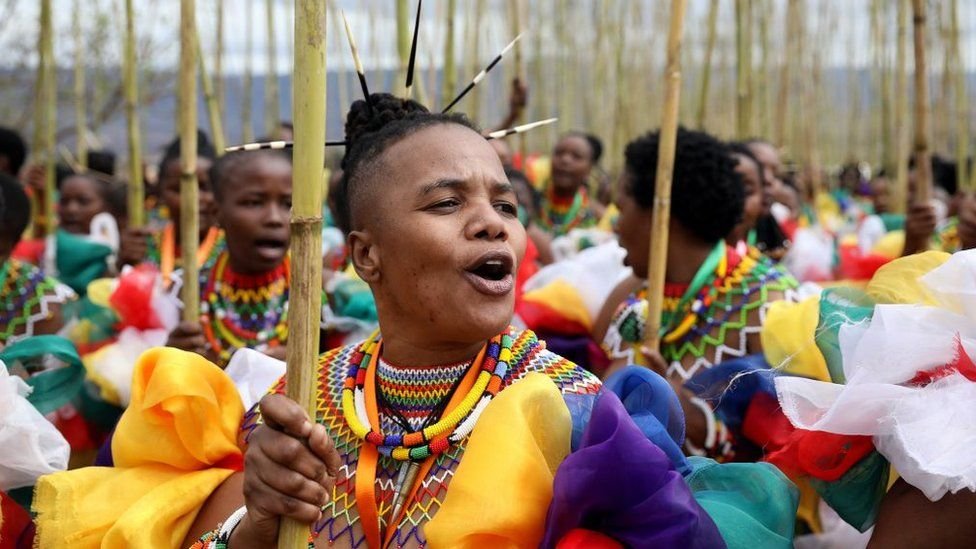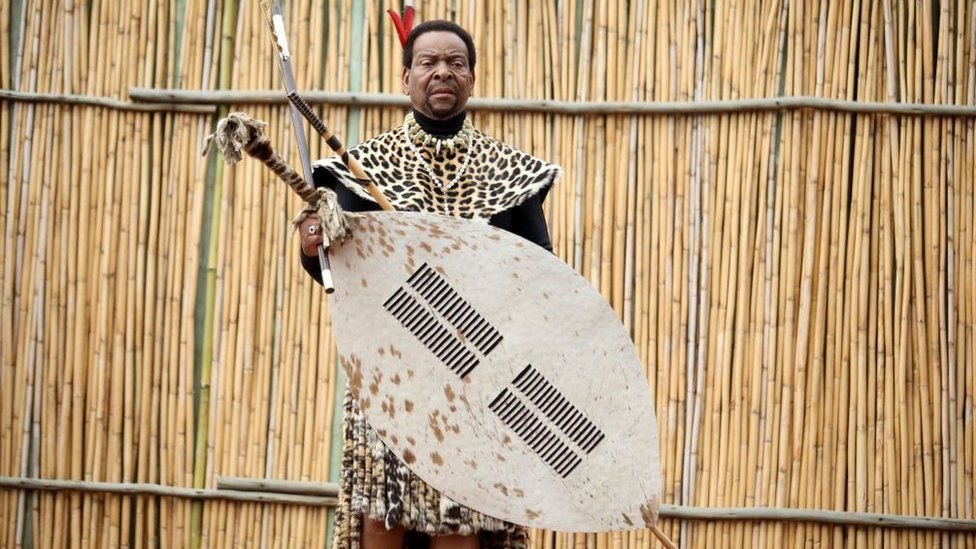Following the death of King Goodwill Zwelithini and the regent a few weeks later, the Zulu monarchy in South Africa has been rocked by controversy.
It has sparked a bloody power struggle for the throne, with royals squabbling in court, hurling insults in public, and fueling rumors of rivals being poisoned.
Pumza Fihlani of the BBC in Johannesburg examines some of the major players in the royal drama.
Father of the nation: King Goodwill Zwelithini
He was the Zulu nation’s eighth king, having been born on July 14, 1948. Following death threats, he was forced to go into hiding for three years before taking over from his father in 1971.
Isilo Samabandla Onke, also known as “King of All Zulu Kings,” was a direct descendant of King Cetshwayo, the Zulu nation’s chief during the 1879 war against the British army.
To many, the father of 28 children from six wives represented the upholding of long-standing cultural traditions. The revival of Umhlanga, or Reed Dance, in 1991 was a highlight of his reign.
The ceremony attended by hundreds of young unmarried Zulu women was intended to celebrate virginity. Still, King Zwelithini said it was also held to raise HIV and Aids awareness in KwaZulu-Natal, which has one of the country’s highest HIV infection rates.
On March 12th, King Zwelithini died in a hospital where he was being treated for diabetes. With nearly 50 years on the throne, he was the Zulu king with the longest reign.
His will was read out at a private meeting of the royal family after he was interred. It has now become the subject of a major feud within the royal family, with some royals alleging it was forged.
The kingmaker: Queen Mantfombi Dlamini-Zulu
The king appointed her regent of the 11-million-strong nation according to his will.
During the three months of mourning, Queen Dlamini-Zulu presided over the throne and declared the king’s successor. But she died before she could do so.
She married the Zulu monarch in 1977 and was the child of Eswatini’s King Mswati III.
Queen Dlamini-Zulu was dubbed the “Great Wife” because she was descended from royalty. With the late King, she had eight children.
Her lobola, or bride price, of about 300 cattle was paid by the Zulu nation after a selection within communities, unlike the king’s other wives.
Historians believe that this cemented her role as a senior member of the royal family.
Her appointment as regent fueled rumors that her eldest son, the 46-year-old Prince Misizulu, who was educated in the United States, will be the next king, but the royal family has yet to confirm this.
The 65-year-old died on Thursday from an unidentified illness, only a month after taking over as regent.
The queen’s untimely death on April 29 has raised several concerns and sparked rumors of a murder plot.
She had been spending more time in Eswatini in recent years, ostensibly to attend to her welfare.
King Zwelithini once explained her absence to the Zulu nation by claiming she had been poisoned.
“The king spoke before hundreds of people in December 2017, when we gathered for the [46th] anniversary celebration of his coronation. In front of all these people, His Majesty said: ‘Mnemtanenkosi has been poisoned. That is why she is not with us,” Chief Mangosuthu Buthelezi, the Zulu traditional prime minister, said in a statement earlier this week.
There is no further information on the 2017 poisoning charges, although it is known that she has been in and out of hospitals since then.
Her cause of death is also unknown. According to Chief Buthelezi, a post-mortem had been performed to determine the cause of death, and the findings were expected in a few weeks.
“When I announced Her Majesty the regent’s passing, I spoke in isiZulu, explaining that doctors had not wanted to operate because of toxins in her liver. This required treatment with antibiotics in the hope of reducing the infection. Toxins are not the same thing as poison,” he spoke on Monday in the midst of rumors that she had been poisoned once.
The disillusioned queen: Sibongile Dlamini
She is the first wife of King Zwelithini and has filed a court case seeking half of her late husband’s vast estate, which includes many properties and hectares of prime land across KwaZulu-Natal; the king was a trustee of.
The amount of money the king left behind is unknown. The KwaZulu-Natal government contributes 71 million rands ($5 million; £3.5 million) a year to the royal household’s upkeep.
Only Queen Dlamini and the king were married in a community of land, according to her.
She wants the court to annul his other five conventional marriages, preventing them from receiving an equal share of the estate, recognizing her as the only legitimate wife, and preventing anyone not from her family from ascending to the throne.
In reality, she claims to be the “Great Wife,” or “Udlunkulu” in Zulu, because she was the king’s first wife, married to him under civil law, which forbids polygamy.
Queen Dlamini also admitted in a court affidavit that she was forced to marry King Zwelithini at the age of 20 under the ancient cultural practice of “ukuthwala” (abduction for marriage).
She stated, “In my case, I was brought to the home of the late Isilo through the custom of ukuthwala in order to marry the late Isilo so that in turn, he could take up the throne as the monarch of the Zulu nation.”
She claims that the royal household estate belongs in equal parts to her and her late husband and that any attempt to sell it “as if it were the sole property of the late Isilo is legally incompetent and impermissible.”
Meanwhile, two of Queen Dlamini’s daughters are contesting the authenticity of their late father’s will, claiming they have evidence to believe it was fabricated in a separate court case. They’ve lent their support to Queen Dlamini’s claim to the estate.
The dead prince: Lethukuthula
For years, it was assumed that the king’s eldest son, Prince Lethukuthula, would be chosen as his successor since he was the king’s first wife’s son.
However, in November, the prince died in mysterious circumstances. Some monarchists claim his death was staged to prevent him from assuming the throne, although this has never been proved.
Five people have been arrested in Pretoria, South Africa’s capital, for the murder of the 50-year-old prince: four women aged 27 to 42 and a 32-year-old male.
They have not yet been asked to enter a plea since the investigation into his death is still pending.
According to initial sources, the prince allegedly hosting at his home drugged and robbed him and his business partner.
Later, the prince was discovered dead, and the business partner was discovered sleeping in a separate bedroom.
At the time, a palace spokesman was quoted as saying that protecting all of the king’s children would be too costly and a “nightmare.”
MORE:
- Shaka Zulu, The Great Warrior of Southern Africa
- White Leaders in South Africa: How they carved out ‘free’ Black State apartheid end
The ‘royal rebels’: Prince Mbonisi and Princess Thembi
Prince Mbonisi and Princess Thembi, the king’s siblings, were accused of conducting hidden royal court meetings only days after death. They were reportedly against Queen Dlamini-Zulu’s selection as interim leader.
Some royal family members have expressed their displeasure with the news of the secret meetings, believing that they would trigger divisions.
On the other hand, the siblings have denied that their acts are malicious, claiming that they were debating ways to help the new regent and wanted to inform the rest of the royal family.
They’ve also denied any role in the queen’s death.
“People think we’re murderers,” Princess Thembi said at an impromptu press conference on Sunday amid a bitter family feud over the succession to the throne.
She went on to say that they were “not plotting to overthrow anyone” and that she was offended by the implication.
The mouthpiece: Chief Mangosuthu Buthelezi
Chief Buthelezi has been speaking about the royal family’s developments since King Zwelithini’s death.
He was the late king’s conventional prime minister, and he was instrumental in announcing the monarch’s and regent’s deaths and keeping the public updated about funeral arrangements.
However, some princes and princesses have chastised him for his position, accusing him of suppressing dissent and being a tyrant and disputing his claim to be King Zwelithini’s traditional prime minister or chief adviser.
“His time [as traditional prime minister] ended long ago. The reason why he is still in that position is because we respect him,” Princess Thembi was said to have quoted.
Chief Buthelezi dismissed the princess as “an illegitimate child of my cousin, King Cyprian,” and characterized Prince Mbonisi as a “runner of errands” for the king.
“Perhaps most distressing of all is the claim that Her Majesty the Regent was somehow shoved downs their throats. His Majesty the King appointed Her Majesty as Regent. If they have a quarrel, it is with the king himself,” said Chief Buthelezi according to South Africa’s News24 website.
It’s uncertain how the leadership crisis will be addressed or when the next king will be selected.
However, the royal family is under immense strain to take place in a peaceful and dignified manner.
Many Zulus, though, revere the monarchy, which represents centuries of tradition.




















